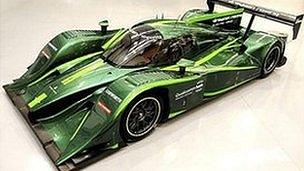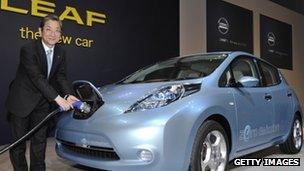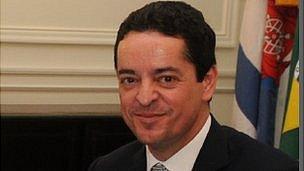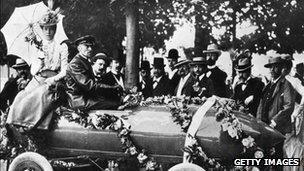Formula E electric car racing series is launched by FIA
- Published

The electric Lola-Drayson B12/69EV can do 0-60 mph in three seconds
In the world of motor racing the internal combustion engine is king.
Circuits around the world regularly echo to the earsplitting howl of racing V10s and V12s at full throttle. But perhaps, not for much longer.
Motorsport's governing body, the Federation Internationale de l'Automobile, or FIA, has announced plans for a brand new motor racing series, designed exclusively for electric cars.
The new championship, known as Formula E, is due to begin in 2014.
Manufacturers are being invited to design and build their own cars, which will race on city-centre circuits around the world.
It will be run by Formula E Holdings, a consortium of investors led by the Spanish billionaire Enrique Banuelos, who made his fortune in real estate and agribusiness.
The FIA says it represents "a vision for the future of the motor industry over the coming decades".
Four-wheeled bicycles
The thinking behind the series is simple: electric cars have an image problem, and the series' backers think motor racing can help to resolve it.
Until recently, battery cars were simply impractical. They were slow, heavy and expensive and had very limited range between charges.
That situation is now changing, with the launch of models such as the Nissan Leaf and Ford Focus Electric, which have reasonable performance and batteries which can cope with longer journeys.
But sales remain very sluggish. In the US, nearly 13 million cars were sold last year, but fewer than 20,000 were electric.

Cars such as the electric Nissan Leaf can cope with longer journeys
"Electric cars haven't been cool up until now", says motor industry analyst Jay Nagley, who runs the cleangreencars.co.uk website.
"Until the Nissan Leaf came along they were basically four wheeled bicycles, with a battery pack and a terrible safety record. So there is a need to change the image."
But can motorsport help to make electric cars sexy? One man who thinks so is British businessman, part time racing driver and former government minister Lord (Paul) Drayson
His company, Drayson Racing Technologies, has spent the past two years developing an electric racing car, and he is acting as scientific adviser to the new championship.
"This gives us the perfect way to showcase the performance of electric cars", he says.

Formula E investors are led by Spanish billionaire Enrique Banuelos
"People think they're slow. We will show that it's possible to do 200 mph, or 0-60 in three seconds.
"Our ultimate goal is to create a sporting spectacle which is both sustainable and exciting".
He believes the series will not only promote electric cars, but help to develop them as well - making road cars better.
"A lot of research and development still needs to take place, and motorsport has always been a tremendous driver of R&D", he says.
"Many of the things we take for granted on our road cars started out on a racing car. Even the humble rear view mirror was first fitted to a race car in the US in the 1920s."
Fast but silent
Yet the idea of electric motorsport has plenty of critics. They claim that electric cars lack something which motorsport fans yearn for - noise, and plenty of it.
But according to Lord Drayson, they're missing the point.
"What we're trying to do is create a new racing experience. It will be a different type of car, racing through the city streets, before new audiences, in places where we haven't raced before."
He believes that while older fans may lament the lack of a howling exhaust note, young people simply won't notice.

Even the most sophisticated electric racing cars have some limitations
Chris Aylett, the chief executive of the Motorsport Industry Association agrees.
"It will be a very trendy, very modern, futuristic form of racing", he says.
"We're not talking about appealing to the grey market with these cars. We're looking at the 15 year old today who will be tomorrow's car buyer".
This isn't the first time that motorsport has attempted to embrace environmentally-friendly technologies.
This year's Le Mans 24 hours was won by a diesel-electric hybrid, while Formula One cars have been using energy recovery systems for the past two years. Technically, that makes them hybrids too.
But the new series is certainly a radical venture. And in order to get around some of the limitations which affect even the most sophisticated electric cars, it has had to embrace some very radical ideas.
The batteries in the new cars are expected to run down relatively quickly. So when a driver comes into the pits, he won't just change his tyres.
He'll change the whole car - swapping it for a new, and fully charged machine.